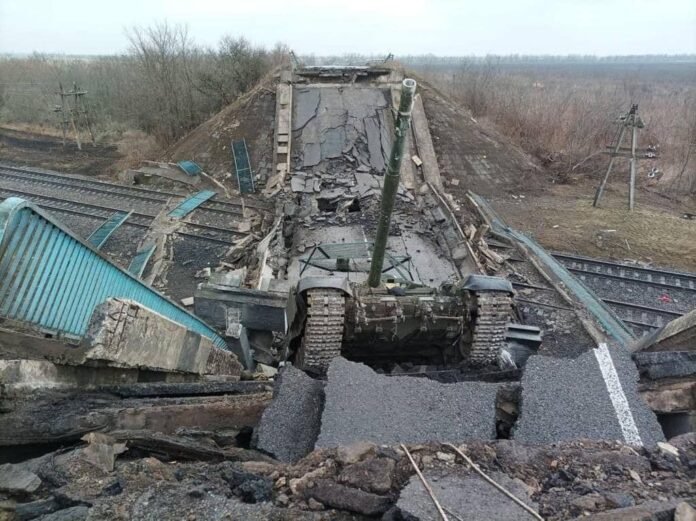
Analysis by Keith Rankin.

The war in Ukraine possibly represents the most dangerous episode in the history of humanity in historical times; especially but not only because it comes on top of two other overt global crises – climate change and pandemic – and another less overt global crisis, the slow implosion of the international capitalist world order through wealth and income inequality.
The world news at present is dominated by the emotion of the war in Ukraine – and by angst about oil and gas prices. There is not much realistic assessment about how, let alone when, the conflict might end. The ‘Fog of War’ remains a dense pea-souper.
What will constitute ‘success’ or ‘failure’ sufficient to bring an end to the war? In a traditional sense, a war ends when one side ‘wins’ and the other side ‘loses’. But how do combatants, who have already ‘invested’ so much in a conflict, decide that a situation has crossed the line from ‘stalemate’ to ‘checkmate’.
Some historical examples. Has the invasive war in Iraq ended? Not really. Has the Korean War ended? No, there was a cease-fire nearly 70 years ago which has for the most part held. The protracted wars in Vietnam and in Afghanistan did end, eventually, with the military evacuations of the invader countries. (Afghanistan suffered three protracted wars, with British, Russian and then American invaders all retreating ignominiously. Vietnam suffered an unprotracted war with China in 1979, four years after the American final retreat from Vietnam in 1975; China ‘declared victory’, and quickly departed in March 1979.)
Did World War One end? In 1918 there was an armistice. In reality, the invasion of France in May 1940 was simply the end of a 21½ year pause in hostilities. Thus World War One actually ended in May 1945, with the Soviet Russian ‘liberation’ of Berlin. World War Two – the world’s only nuclear war so far – then ended in August 1945, with the Surrender of Japan. Prior to the nuclear detonations, the Japanese war-leaders had given every indication that their country would fight until everyone was dead.
(In probable fact, the Japanese surrender was precipitated by the less existential choice between being occupied and resurrected by the United States or by Russia; Japan chose the United States. We might also note that World War Two began in 1937 with the invasion of China by Japan. Wikipedia notes: “7 July 1937 is sometimes given as an alternative starting date for World War II as opposed to the more commonly-cited [Eurocentric] date of 1 September 1939″.)
The View from Putin’s Russia
It seems unlikely that Russia will simply ‘declare victory’ and then withdraw, as China did from Vietnam in 1979. This is much more complex. The following quote, from someone (Alexei Fedorov; see this earlier piece on Al Jazeera: Russian ex-official: Putin’s plan is full victory by March 2) who understands Vladimir Putin’s deeply (and widely) held ‘made Russia great again’ romantic nostalgia:
“I agree that he will not stop, I have known him for many years. Most probably in the coming five days the military operation will be extended to much more territory, including the city of Odessa. The Russian army will surround Kiev and then there will be a kind of ultimatum maybe for 24 hours for Zelenskyy to resign, to declare something like an interim government, because from a military point of view it’s very dangerous to start a military attack on Kiev because it can bring a lot of damages. And also let’s not forget that Kiev is playing an important historical role in Russia’s history. In Russia it is called ‘mother of all cities’.”
(This quotation is from the Al Jazeera News bulletin, 5:15am New Zealand time, 6 March 2022.)
Putting aside the short timeframe indicated, Fedorov is almost certainly correct in his description of how conservative Russians view Kiev (Ukrainian, Kyiv). (In High Noon?, I recently mentioned the matter of the Kievan Rus in modern Russian mythology.) The ‘good news’ is that Putin will go to considerable lengths to avoid damage to central Kyiv; and maybe Odesa too.
The ‘bad news’ is that Putin is too far advanced down this path to let go. From the Russian side this war can only end with unambiguous defeat (possible, but unlikely) or a ‘victory’ which would include the incorporation of at least two-thirds of the “territory of Ukraine” (plus Transnistria) into Russia.
From this Russian point of view, Ukraine is a ‘territory’, not a country; much as ‘the Canterbury Plains’ is a territory of New Zealand. (We should note the use here of the word ‘the’. As such, our media and politicians – including New Zealand’s Minister of Foreign Affairs – should avoid references to ‘the Ukraine’. As a recognised sovereign country, it is simply ‘Ukraine’.)
How could the war end as a result of a Ukrainian decision? Certainly, one way would be for the Ukrainian government to accept an ‘ultimatum’ of the sort mentioned above by Fedorov. Or the Zelenskyy government could pre-empt such an ultimatum; or indeed face some kind of ‘enough-is-enough’ ultimatum from ‘the West’.
This is an asymmetric conflict. To the present Russian regime it’s a domestic ‘civil’ conflict much like that in Chechnya in the 1990s; the reprimand of an incalcitrant province. To the international community, however, it’s clearly an invasion of one sovereign nation by another. In the absence of an unambiguous military outcome, this war cannot be resolved unless each side understands – though not necessarily agrees with – the other side’s perspective.
And it’s asymmetric in a more obvious way. Ukraine is small compared to Russia; just as Georgia is small (indeed smaller, after 2008), and Chechnya is small. And Russia has a nuclear arsenal!
The Bank Robber analogy
Imagine a bank robber with a cocked machine gun, and a duffle bag with a bomb in it. When the robber says “hand-over the money”, we understand that the bank employee should hand over the money. We put safety over pride, and conspire that the robber meets his come-uppance in a future episode. No authority would advise bank employees to resist, indefinitely, an armed robbery.
That might be the way this conflict has to play out. There will always be ‘another episode’, because, cryogenics notwithstanding, all humans are mortal. It’s not clear that the present Russian Tsar can perpetuate himself indefinitely, although such perpetuation has happened so far in North Korea with the Kim dynasty.
In the absence of an unlikely Ukrainian victory ‘in the field’, an affirmative eventual outcome all depends on how long the ‘forces of Ukrainian freedom/independence’ – and the forces of the liberal west – are willing to wait. It’s called ‘playing a long game’; indeed, we note that in some countries in the world – we particularly note South America as a region – the forces of decolonisation are making clear progress in a long-game which has lasted nearly half a millennium.
In this particular case, however, the world could be looking at a relatively short ‘long game’. There are substantial liberal forces within Russia; and – unlike the failed Arab Spring in Egypt last decade – there is not the complication of an organisation such as the Muslim Brotherhood.
Imagination over Emotion
For any resolution to take place, enough people have to be able to imagine a way out. Emotion will not solve the Russia-Ukraine conflict. Indeed, emotion rarely resolves any conflict. Common sense, patience, and sympathetic empathy can achieve much more.
*******
Keith Rankin (keith at rankin dot nz), trained as an economic historian, is a retired lecturer in Economics and Statistics. He lives in Auckland, New Zealand.






